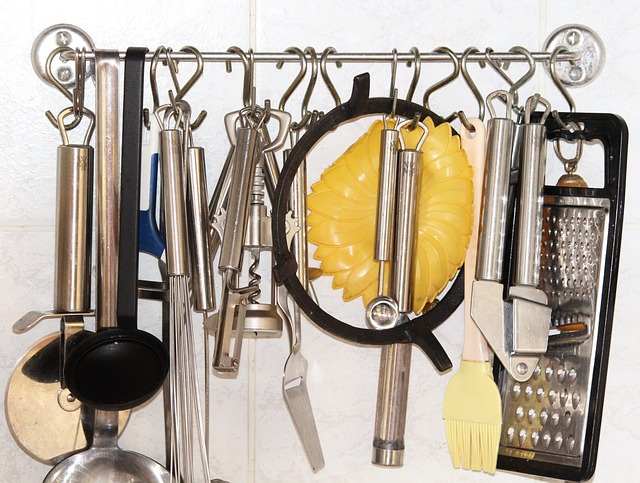What is a Food Truck Commissary?
A food truck commissary is a commercial kitchens where food truckers go to prepare and store their food.
Food truckers will often rent space in a commissary, which saves a ton of money over renting your own private commercial kitchen facility.
Food truck commissaries are often required in most cities – there are many laws that disallow food sellers from prepping or storing food in their own homes (for health and safety purposes).
Rules vary between states and cities, so you’ll have to read up on you own local laws and local health code requirements. In Boston, for example, food trucks cannot receive their food truck permit without first showing proof that they are operating out of a licensed food establishment, such as a food truck commissary. For the mandatory health permit, food trucks must report to their licensed food establishment twice each day for cleaning and sanitization.
This means that for food truck business, getting in with a commissary or commercial kitchen is a required early step – you can’t get your food truck permit (at least not in Boston) without one.
Types of Food Truck Commissaries
There are a few different kind of food truck commissaries you can get involved with.
Shared Space Commercial Kitchens
Shares space commercial kitchens are the most popular type of commissary kitchens for food trucks, at least when starting out. Sharing space in a commercial kitchen means you’ll be renting space alongside other food truckers, as well as caterers and chefs.

Pros:
- Lower cost. Shared space kitchens are much less expensive that private kitchens.
- Working alongside other food truck businesses. Working in shared space with other food trucks provides ripe opportunities for bouncing ideas off each other and potential collaboration.
- Experienced mentors can help. Some kitchen commissaries will have managers who are well-versed in the food industry and are available for help and guidance. While guidance varies depending on the facility, if you’re new to food truck business, it can help to have foodie pros close by.
Cons:
- Coordination. Multiple cooks in the kitchen means juggling schedules. Sometimes your time slot will be in the wee hours of the morning. You don’t get full control of when you’ll prep and cook, and that can frustrate some food truck owners.
Private Commercial Kitchen
Another option is renting space in a private commercial kitchen. You’ll be paying more for privacy, but you’ll have a lot more freedom and control. Many food truck commissaries have shared and private space available to rent.

Pros:
- You have full control of your schedule. You get to pick and choose when you want to prep and cook your food.
- More storage space. Since the whole kitchen is yours, you have more storage space (which can also allow you to buy more in bulk). Plus, all the equipment, ingredients, and tools are all your own.
- Other Service Options. Possibility to expand into pickup and carryout options.
Cons:
- More expensive than shared kitchens. The price tag is higher when you’re renting private space.
- Not as much guidance. You’re much more isolated with a private kitchen, which means you won’t get as many opportunities to pick the brains of fellow food truckers or ask for help when you need it. Many food truck commissaries offer private kitchen space, which means you’ll still have access to their pro advice, but you won’t be working alongside other truckers, leading to less serendipitous interactions.
Major Advantages of Food Truck Commissaries
Whether you go with a private space in a commercial kitchen commissary, or a shared space, working out of a food truck commissary provides a host of benefits, such as:
Safe Food Prep Space
There are a plethora of health codes and food safety requirements that food businesses are required to meet. Rules vary by city – some cities say no raw food can be on the truck, others say no cooking whatsoever can happen on a truck. Depending on your city’s rules, you’ll need to rely even more heavily on having a clean, safe prep space.
Up-To-Date Health Code Requirements
Using a commissary provides you with an officially licensed facility that is required to be up-to-date on health code requirements. The advantage is that it’s the commissaries job to provide a clean, healthy environment and they’ll be the ones to deal with inspectors.
The bad news is that if another truck or food biz renter commits a health violation, the whole facility could be shut down and slow you down for a while.
Storage & Supplies
Food truck commissaries provide much-needed space for your ingredients, supplies, etc.
Kitchen commissaries also come equipped with professional cooking equipment and tools. Many commissaries also can provide basic supplies like ice, plates, napkins, utensils, and even produce, meat, rice, etc.

Designated Parking Spot
Many cities have strict rules about where food trucks should park overnight. Why? Food trucks need a lot of electricity to function all day. Requiring trucks to park at commissaries forces trucks to always charge up each night. This decreases the chance of food going bad from lack of refrigeration power.
Parking at a food truck commissary every night also gives trucks a reliable place to clean and sanitize their trucks.
Cleaning
As mentioned above, most commissaries are equipped with special cleaning facilities that match your city’s requirements.
You’ll want to clean both your truck and your kitchen equipment each day. Many commissaries have wash bay facilities, helping your dispose wastewater and grease.
Dumpsters for solid waste are also common, and you’ll want to keep an eye out for recycling facilities as well. The average food truck goes through 100 lbs of cardboard each month!
Truck Mechanics
Food trucks are a special mix of automobile and mobile kitchen. This means that when you get into a fender bender, you won’t want to simply run to the nearest mechanic. A mechanic may know trucks very well, but they could easily screw up your plumbing or kitchen electrical system. Many commissaries have mechanics on hand who know how to handle food trucks, which is a serious plus.
Extra Bonus: Some commissaries have a host of extra features, like extra food trucks to rent or buy, towing services in case your truck breaks down, incubator funding opportunities, etc. Some commissaries can also provide a ton of guidance and can help you navigate your city’s food truck laws and legislation.
More Food Truck Kitchen Options
You don’t have to simply choose between a shared kitchen commissary or a private one. There are other options at your disposal as well.
- Use an Established Restaurant’s Kitchen. Some restaurant will rent out their kitchen space during their off hours. This often means access to professional equipment at a lower cost.

- Use Your Own Kitchen. One of the major benefits of having a brick and mortar location as well as a food truck is that the brick and mortar restaurant kitchen can be used to prep for the food truck food. This saves a ton on commissary costs.
- Find Other Certified Commercial Kitchens. Some food trucks end up renting space from local certified commercial kitchens, like schools, Elk’s Clubs, churches, hotels, etc. In some cases they may simply ask you to cater events as a means of payment.
How Do I Find A Food Truck Commissary?
The easiest way to find a food truck commissary near you? Ask around town! Get in contact with other food trucks and ask which commercial kitchens or commissaries they use.
Your local health department should also be able to provide you with information regarding commercial kitchens in your area.
You can also try checking out CulinaryIncubator.com, which provides a map detailing commercial kitchen facilities available for rent near you.
Food Truck Commissary Costs
The cost of renting space at a food truck commissary can vary greatly depending on your location.
- Most shared kitchen commissaries are fairly affordable, with most commissaries offering an hourly rate between $15 – $35/hour. Pricing is affected by location, facilities, and other perks.
Some commissaries also require that you rent a certain amount of hours. For example, Crop Circle Kitchen charges $35/hr, and you must spent 10 hours each month minimum, aka pay at least $350/month.
- Private kitchen spaces can get much pricier. In Massachusetts, you can expect to pay anywhere from $2,500 – $4,000 for private commercial kitchen space. Again, location, facilities, and competition will affect price.
- Using commercial kitchen space from private organizations can be a good money-saver, as some community facilities like schools or Elks’ Lodges may only ask for a very small fee. Some will even let you use their facilities for free, so long as you agree to cater their events.
We hope this guide to food truck commissaries has helped! Feel free to share any of your own insight, experience, or questions in the comments section! We’re always looking to hear what truckers think.


Greetings;
I am trying to find the rental price for a space for a food trailer in central MA.
Can you give some pointers in how to find out?
You help is much appreciated.